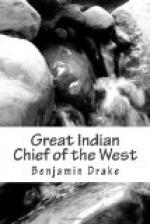It is no easy task to present in a satisfactory manner, a biographical sketch of an Indian. However eventful his life may have been, it is only a few of the more prominent of his deeds which become known to the world; while the minor incidents, those small matters, which make up the sum of human character, pass unobserved by his companions, or if noticed, are soon forgotten. The subject of the present chapter, is yet in the meridian of life, high in power, and in the enjoyment of a distinguished reputation. Yet the materials for estimating his character, and for tracing his progress, step by step, from the obscurity of a private station, to the most honorable post in the nation over which he now presides, are neither full nor satisfactory. Barely enough is known of him, throughout the United States, to create the desire to know more; and it is to be regretted that the means of gratifying this laudable curiosity, are not more abundant.
Keokuk is a native of the Sac nation of Indians, and was born near or upon Rock river in the north western part of what now constitutes the state of Illinois, about the year 1780. He is not a hereditary chief, and consequently has risen to his present elevation by the force of talent and of enterprize. He began to manifest these qualities at a very early period of his life. While but a youth he performed an act, which placed him, as it were by brevet, in the ranks of manhood. In the first battle in which he engaged, he encountered and killed a Sioux warrior, with his spear, while on horseback; and as the Sioux are distinguished for their horsemanship, this was looked upon as so great an achievement, that a public feast was made in commemoration of it, by his tribe; and the youthful Keokuk, was forthwith admitted to all the rights and privileges of a Brave. It was further allowed, that ever afterwards, on all public occasions, he might appear on horseback, even if the rest of the chiefs and braves were not mounted.
During the late war between the United States and Great Britain, and before Keokuk was entitled to take his seat in the councils of his nation, an expedition was sent by our government, to destroy the Indian village at Peoria, on the Illinois river. A rumor reached the Sac village, in which he resided, that this expedition was also to attack the Sacs, and the whole tribe was thrown into consternation. The Indians were panic stricken, and the council hastily determined to abandon their village. Keokuk happened to be standing near the council-lodge when this decision was made. It was no sooner announced than he boldly advanced to the door and requested admission. It was granted. He asked leave to speak, and permission was given him. He commenced by saying he had heard with deep regret, the decision of the council—that he himself was wholly opposed to flight, before an enemy still distant, and whose strength was entirely unknown. He called the attention of the council to the importance of meeting the enemy in their approach—of harassing their progress—cutting them off in detail—of driving them back, or of nobly dying in defence of their country and their homes.




